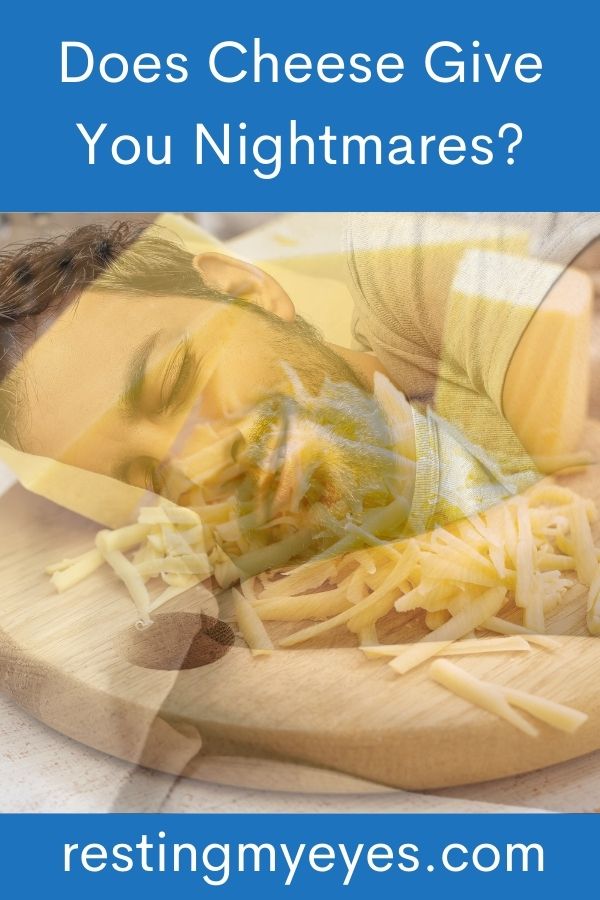So, it’s not true that eating cheese gives you bad dreams or nightmares as a matter of course.
There may be good reason to believe eating cheese before bed will mean your body is overall more awake as it attempts to digest the food, but this doesn’t necessarily mean nightmares.
It just means you will remember your dreams.
Let’s look further into this.

Can cheese cause bad dreams?
It depends on your understanding of cause’, really, but the simple answer is no.
While dreams have very individual character, the simple fact is that we dream every night more or less constantly.
We dream most strongly during REM sleep.
Our sleep goes through cycles each night, and REM is one of the deepest, and where we usually dream.
What eating cheese will do before bed is cause your digestive system to be working overtime when it should be resting.
Any dairy product, even for those who are not lactose intolerant, is not easy for your gut to break down.
That extra effort is going to make it harder for you to sleep.
That added level of stress could, in turn, cause unpleasant dreams.
But it’s not really the cheese that is the root cause.
You’re being kept awake.
The other thing to stress, as I mentioned, is the fact that you probably aren’t going to be in a deep sleep if you’ve eaten cheese before bed.
Your body will be slightly awake.
This causes you to remember your dreams more clearly.
What about night terrors?
Can cheese cause night terrors?
This is somewhat of an open question, as there is something of a link to be shown.
Dairy contains an amino acid call tryptophan, which can interfere with the hormone that aids in sleep, serotonin.
Many have indeed reported more frequent night terrors when they are regularly eating cheese at night.
That said, this is exclusively in people who are already inclined to night terrors.
Night terrors are quite a unique phenomenon, and there is almost definitely more going on in a case of night terrors than bad late night eating habits.
Ultimately, if you experience night terrors, eating cheese at night is probably a bad idea.
Why shouldn’t you eat cheese at night?
Even if it doesn’t cause bad dreams, eating cheese at night is likely to interfere with your proper sleeping pattern.
As I said, the fact is that for anyone, cheese is difficult to digest, especially in large quantities.
Your body usually expects you to sleep several hours after eating.
So, if you eat cheese at night, then your body is going to have to work hard to digest it while you’re asleep.
Digestion is obviously not a conscious process, but nonetheless even if you feel as though you have fallen asleep, your body will still be awake and you will not feel so well rested.
Are there any specific types of cheese to avoid, then?
What type of cheese gives you nightmares?
Again, the important thing to stress is that there is no direct link between eating cheese and having nightmares—it’s just about how cheese affects your ability to sleep soundly.
That said, stilton has been commonly named as the cheese which produces the strangest and most unusual dreams.
The vividness is often the big factor, too, as particularly vivid dreams can be scary in their own right.
Ultimately, though, you shouldn’t eat any cheese before bed.
So, there is no scientific or empirical reason to believe that eating cheese specifically causes or leads to bad dreams as such.
The thing to remember is that we dream every night, but it’s whether we remember those dreams that is important.
If you wake up many times in the night, as you’re likely to do after eating a lot of any dairy product late at night, you will remember those dreams more clearly.
That’s really all it comes down to.
More in nightmares
- Can Alcohol Cause Nightmares?
- Can Antibiotics Cause Nightmares?
- Can Antidepressants Cause Nightmares?
- Can Anxiety Cause Nightmares?
- Can Birth Control Cause Nightmares?
- Can Caffeine Cause Nightmares?
- Can CBD Cause Nightmares?
- Can Dehydration Cause Nightmares?
- Can Depression Cause Nightmares?
- Can Dream Catchers Cause Nightmares?
- Can Eating Before Bed Cause Nightmares?
- Can Essential Oils Cause Nightmares?
- Can Exercise Cause Nightmares?
- Can Garlic Cause Nightmares?
- Can Himalayan Salt Lamps Cause Nightmares?
- Can Hormones Cause Nightmares?
- Can Indigestion Cause Nightmares?
- Can Insomnia Cause Nightmares?
- Can Jet Lag Cause Nightmares?
- Can Low Blood Sugar Cause Nightmares?
- Can Magnesium Cause Nightmares?
- Can Meditation Cause Nightmares?
- Can Melatonin Cause Nightmares?
- Can Nicotine Patches Cause Nightmares?
- Can OCD Cause Nightmares?
- Can Orange Juice Cause Nightmares?
- Can Probiotics Cause Nightmares?
- Can PTSD Cause Nightmares?
- Can Quitting Smoking Cause Nightmares?
- Can Sleep Apnea Cause Nightmares?
- Can Sleeping On Your Back Cause Nightmares?
- Can Sleeping Pills Cause Nightmares?
- Can Steroids Cause Nightmares?
- Can Stress Cause Nightmares?
- Can Sugar Cause Nightmares?
- Can Using A CPAP Machine Cause Nightmares?
- Can UTIs Cause Nightmares?
- Can Vaping Cause Nightmares?
- Can Video Games Cause Nightmares?
- Can Vitamins Cause Nightmares?
- Can Walnuts Cause Nightmares?
- Can Weight Loss Cause Nightmares?
- Can Weighted Blankets Cause Nightmares?
- Can White Noise Cause Nightmares?
- Can Worms Cause Nightmares?
- Can Yoga Cause Nightmares?
- Do Bananas Give You Nightmares?
- Do Cats Have Nightmares?
- Does Cheese Give You Nightmares?
- Does Chocolate Give You Nightmares?
